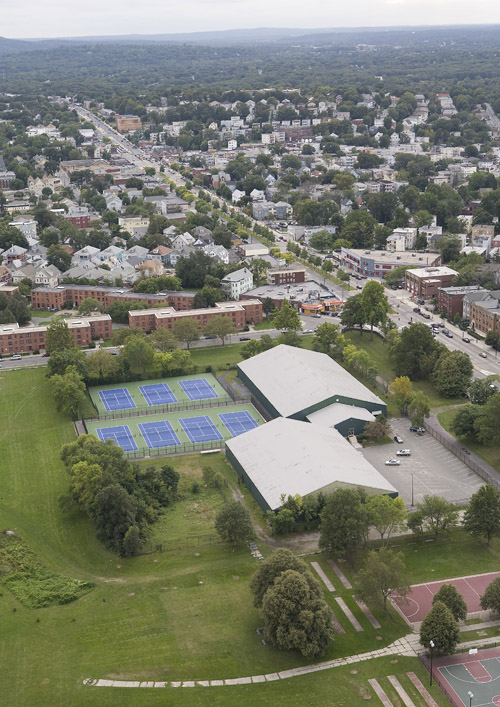Mission and Purpose
The Mass General Brigham (MGB) Center for Community Wellness (CCW) at Sportsmen’s Tennis & Enrichment Center (STEC) promotes healthier living practices to advance health outcomes and health equity in the Boston communities of Dorchester, Mattapan and Roxbury, known as the Blue Hill Corridor (the Corridor).
Our fundamental belief is that health promotion and chronic disease prevention can only happen in neighborhoods if:
- we meet patients as people—where they live, work, and play and not ask them to travel to highly “medicalized” tertiary care hospitals;
- we provide the structures, spaces, and supports for experiential, hands-on learning about health and wellbeing;
- we maintain a committed, long-term physical presence that allows us to be reliable part of the community we serve.
As such, the CCW is specifically designed to provide innovative, community-based, group programs for the prevention of chronic conditions such as diabetes, hyperlipidemia, and hypertension; nutrition support and education; heart-healthy physical activity opportunities; weight management workshops; and other educational opportunities for better health and wellbeing.

“My general philosophy is you’ve got to do prevention not at a high-powered, world-class hospital, but out in the community where people live and work. We’ve got to change the way we think about delivery of health and move it from the hospitals and into the communities.”
Dr. Paul Ridker, MD, MPH
Executive Director of the CCW,
Director of the Center for Cardiovascular Disease Prevention at Brigham and Women’s Hospital, Boston, MA
Background & Philosophy
Boston’s Blue Hill Corridor community is one of the most challenged communities in Boston and Massachusetts overall. With 46,000 residents living in poverty, many are less likely to have and fully utilize health services and health insurance benefits, leading to undiagnosed and untreated disease. In addition, the area is a food, nutrition and exercise desert. It abounds with fast food restaurants and few healthy options and, because of high rates of crime and violence, there are few safe spaces for residents to engage in physical activity. The community faces some of the highest rates of obesity, heart disease, diabetes, hypertension, and stroke seen in Massachusetts.
Accessible health and wellness education and resources are needed to address these disparities and empower residents with the knowledge and tools to improve their personal and family health. Preventive health interventions in under-resourced communities can only be effective if delivered where residents live, work and play. Otherwise, poor health literacy and economic frailty continue from generation to generation, perpetuating entrenched health and life disparities.

The CCW is well positioned to do the critical work of increasing residents’ understanding of the social determinants of health, teaching the fundamentals of health & wellness, and providing experiential learning opportunities in healthy food choices, physical activity, stress management, and other domains of healthy living. The unique partnership between a leading academic hospital—BWH—and a trusted community organization—Sportsmen’s— leverages the assets of both to bring health awareness, education, and promotion to the Blue Hill Corridor community. It provides a trusted, comfortable space for gather in the heart of the Blue Hill Corridor. Together, these two organizations have created a unique platform for community health advocacy, engagement, and enrichment through the CCW.
